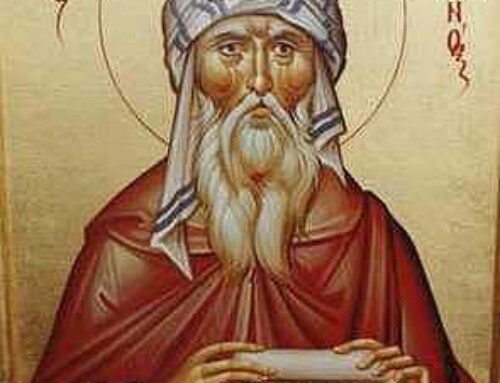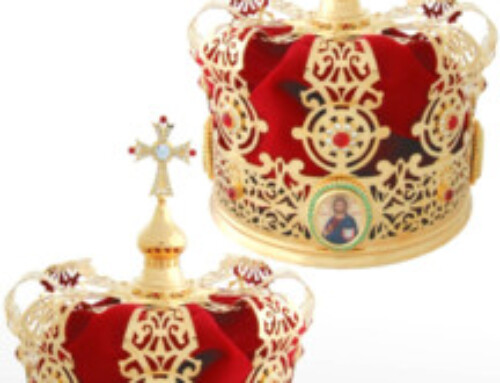The Word Magazine May 1976 Page 10 –11
MARRIAGE AS UNITY AND EDUCATION
By Fr. Joseph Allen
An important quote in the Orthodox Matrimonial Service captures the aspects of unity and education in only a few words:
Unite them in one mind and one flesh, and grant unto
them fair children for education in thy faith and fear.
Listening carefully to that quote, one will see two distinct ideas. The first idea has to do with the union of husband and wife: “Unite them in one mind and one flesh.” The second idea has to do with children and education: “Grant unto them fair children for education in thy faith and fear.”
These two ideas, however, are put together in one sentence for no small reason. They belong together in concept and in spirit. The scope of these words can never be realized in such an article as this; the implications of this quote are tremendous.
But what I can do is to take only a small part of their meaning and relate that small part.
To begin with, these two ideas belong to each other because, what we have to teach to children, is what we are to each other. Thus the Church rightly joins these two concepts which, if one is not attentive to these words, he may miss precisely why the Church has joined these concepts, one to another.
It is where these two concepts cross and interact, i.e. where unity of mind and flesh, and education of the children cross, which is the “small part” to which I hope to turn our attention. Not a didactic “telling-you-how-to-do-it,” but some open-ended thoughts which this quote provokes in my own mind.
Birth and Essentials
We begin with birth itself. We give birth to children from the limited substances of our own bodies, and we wonder whether we have accomplished anything significant in life. A husband and wife are united in one mind and flesh and remain faithful to each other throughout years of joy and anger, tension and harmony, brilliant days and bitter nights. They may be disheartened in their love for many reasons; union of mind and flesh is truly tested and tried in this life.
We all know that we easily forget the “essentials” within this command of “unity” in the face of all the nonessential aspects: a promotion may not come through, a better home may not be possible, a son or daughter may fail to gain entrance to the best possible college. Sometimes these realities are wrongly made essential, are made the measure of a man’s success as a husband and the woman’s adequacy as a wife.
We know, however, that we are not disembodied spirits. We have concerns and responsibilities in this world. Our unity of mind and flesh is thus tested and influenced by values of our society, which sets standards of excellence and achievement. Each man seeks values by which he may measure his own worth.
However, after seeing this reality that our own culture, like every culture, has devised certain
criteria for success, another truth enters. That truth is this: that there is no criterion, particularly for the Christian, except love for life which is ultimately essential. We have been taught, in fact, that there is a demonic influence in our world which reverses “essential” and “non-essential” elements. Adam forgot the essential and began to love the nonessential; we do the same.
If all this language of essential and non-essential sounds complicated, it truly is not, if we remember that husband and wife, in the face of all the shallow and non-essential judgments in this life, are faithful to those essential aspects: What does life mean? What is its real value? What did Christ live and teach?
Home
In these essential truths, and out of that flesh and mind unity — which is itself, an essential of life, we create a home. The two distinct concepts in our quote cross precisely here: in the idea of “home.”
Now I do not mean “home” to be a place — four walls and a roof. More than a place, it is an attitude. It is an attitude based on the essential criteria of this life. Home is something which happens to a person. It is where a person comes to feel a sense of his own personal worth and integrity. Where there is no “home” in this sense, there is only aloneness, and the most terrifying of fears is precisely loneliness. It means that one has become a stranger, that he feels unsettled, never at rest, never “at home” both with others and himself. Someone truly loves us when he brings us home, when he makes us comfortable with ourselves, when he takes from us the strangeness that we feel at being who we, ourselves, are. The father, seeing the essential, accepts the prodigal son to such a home. We are loved when we are accepted, when we are no longer frightened — even with ourselves.
The creation of such a home is essential. Original sin split man’s heart in two, divided man against himself, tore his serenity from himself and God. He is dissatisfied with himself, cannot tell essential from non-essential. He went into history without such a home, but always longing for a home where he could be “at one” with himself again. What is “essential” for our children is no less than what Jesus promised us: such a home, when we shall be called by name, when we shall rush from our prodigal ways and sense the strength of a father’s arms around us. This is what I mean by home, and this is essential.
The Mystery of Life
But in this kind of home we have to educate them in another way, a way which is likewise essential and proceeds from that flesh and mind unity. We must teach them, if you will excuse my language, what the poet knows. It is the poet who sees the mystery of life and tries to establish ties with the essentials of life. His way is the way of devotion. It is such devotion which is our way of singing a song another can hear and of hearing the song another sings. He knows, as our children must know, that the meaning of life depends not on what one possesses or manipulates, but on what one sees in his possession.
Jesus’ heart was a poetic heart when he touched the essentials in life: the blind and the lepers; the children and the dead; John, the faithful; Judas, the traitor. He let life touch Him! Mary of Magdala, Thomas, the doubter, the soldier with the spear. He saw life rather than things, mystery rather than possession, something to serve rather than something to own. To teach a child to be such a poet, is to say that one sees rightly with the heart, and the human heart seeks to die for that which it loves. Such is the unity of mind and flesh, and such is the essential lesson which is forthcoming to our children.
What, then, proceeds from that unity which is essential? — the attitude of “home” and the heart of the poet. These are truly essential to become Christian.
With these two concepts in mind, we shall become Christian, then, on that day when sunshine means more than acquisition; on that day when the children of the world excite us at least as much as its rulers; on that day when we use our hearts to measure the worth of a human being, then we become Christian.
We shall become Christian on that day when we are joyful because so many people are in love rather than affluent — when we learn to make music and poetry, love and peace, when we make ourselves as human as Jesus Himself was. It is all essential to home and poetry.
In the end, we shall become Christian on that morning when we laugh and sing for the right reasons and when we weep not because we have lost something but because we were given so much.
Father Joseph Allen is pastor of St. Anthony’s in Bergenfield, N.J., Associate Editor of THE WORD and chairman of the Continuing Pastoral Education Commission.


